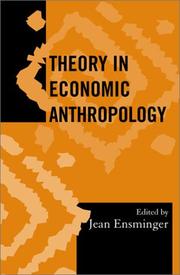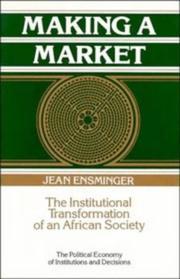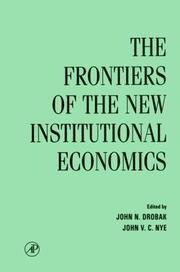| Listing 1 - 7 of 7 |
Sort by
|

ISBN: 0759102058 0759102066 Year: 2002 Publisher: Walnut Creek, CA : AltaMira Press,
Abstract | Keywords | Export | Availability | Bookmark
 Loading...
Loading...Choose an application
- Reference Manager
- EndNote
- RefWorks (Direct export to RefWorks)
Economic anthropology --- Anthropologie économique --- Economic anthropology. --- Anthropologie économique

ISBN: 0521420601 0521574269 9780521420600 Year: 1992 Publisher: Cambridge Cambridge university press
Abstract | Keywords | Export | Availability | Bookmark
 Loading...
Loading...Choose an application
- Reference Manager
- EndNote
- RefWorks (Direct export to RefWorks)
Oromo (African people) --- Economic anthropology --- Nomads --- Institutional economics. --- Oromo (Peuple d'Afrique) --- Anthropologie économique --- Nomades --- Institutionnalisme --- Economic conditions --- Sedentarisation. --- Conditions économiques --- Sédentarisation --- Sedentarisation --- Institutional economics --- Gala (African people) --- Galla (African people) --- Gallas --- Orma (African people) --- Cushites --- Ethnology --- Nomadic peoples --- Nomadism --- Pastoral peoples --- Vagabonds --- Wanderers --- Persons --- Herders --- Economics --- Commerce, Primitive --- Economics, Primitive --- Sedentarization --- Nomads - Kenya - Sedentarisation --- Oromo (African people) - Economic conditions --- Economic anthropology - Kenya --- Economic conditions.
Book
Year: 1996 Publisher: Cambridge: Cambridge university press,
Abstract | Keywords | Export | Availability | Bookmark
 Loading...
Loading...Choose an application
- Reference Manager
- EndNote
- RefWorks (Direct export to RefWorks)
Book
Year: 2022 Publisher: National Bureau of Economic Research
Abstract | Keywords | Export | Availability | Bookmark
 Loading...
Loading...Choose an application
- Reference Manager
- EndNote
- RefWorks (Direct export to RefWorks)
Book
ISBN: 1610448405 9781610448406 9780871545008 0871545004 1610448057 9781610448055 9780871544766 0871544768 Year: 2014 Publisher: New York, New York
Abstract | Keywords | Export | Availability | Bookmark
 Loading...
Loading...Choose an application
- Reference Manager
- EndNote
- RefWorks (Direct export to RefWorks)
Report of a study testing the effects of classes on intergroup dialogue at 9 universities with students randomly assigned to a class or a control group.
Economics --- Experimental economics --- Social norms --- Game theory --- Games, Theory of --- Theory of games --- Mathematical models --- Mathematics --- Folkways --- Norms, Social --- Rules, Social --- Social rules --- Manners and customs --- Social control --- Economic theory --- Political economy --- Social sciences --- Economic man --- Sociological aspects --- Social aspects --- Methodology --- #SBIB:39A2 --- #SBIB:303H12 --- #SBIB:303H31 --- #SBIB:316.7C123 --- 316.754 --- 316.754 Sociale normen --(sociologie) --- Sociale normen --(sociologie) --- Antropologie: methoden en technieken --- Methoden en technieken: sociale wetenschappen --- Kwalitatieve methoden: sociale en culturele antropologie --- Cultuursociologie: sociale normen --- Communication in education. --- Interpersonal communication. --- Intercultural communication. --- Cross-cultural communication --- Communication --- Culture --- Cross-cultural orientation --- Cultural competence --- Multilingual communication --- Technical assistance --- Interpersonal relations --- Education --- Anthropological aspects --- Communication in education --- Interpersonal communication --- Intercultural communication --- Intercultureele communicatie
Book
Year: 2022 Publisher: Cambridge, Mass. National Bureau of Economic Research
Abstract | Keywords | Export | Availability | Bookmark
 Loading...
Loading...Choose an application
- Reference Manager
- EndNote
- RefWorks (Direct export to RefWorks)
When organizations have limited accountability, antifraud measures, including auditing, often face barriers due to institutional resistance and practical difficulties on the ground. This is especially true in development aid, where aid organizations face incentives to suppress information about misappropriated funds and may operate with limited transparency. We develop new statistical tests to uncover strategic data manipulation consistent with fraud. These tests help identify falsified expense reports and facilitate monitoring in difficult-to-audit circumstances, relying only on mandated reporting of data. While the digits of naturally occurring data follow the Benford's Law distribution, humanly-produced data instead reflect behavioral biases and incentives to misreport. Our new tests improve upon existing Benford's Law tests by being sensitive to the value of digits reported, which distinguishes between intent to defraud and error, and by improving statistical power to allow for finer partitioning of the data. We apply this method to a World Bank development project in Kenya. Our evidence is consistent with higher levels of fraud in harder to monitor sectors and in a Kenyan election year when graft also had political value. The results are validated by qualitative data and a forensic audit conducted by the World Bank. We produce simulations that demonstrate the superiority of our new tests to the standards in the field. Our tests are useful beyond development aid, including for monitoring corporate accounting and government expenditures.


ISBN: 0122222407 Year: 1997 Publisher: San Diego : Academic Press,
Abstract | Keywords | Export | Availability | Bookmark
 Loading...
Loading...Choose an application
- Reference Manager
- EndNote
- RefWorks (Direct export to RefWorks)
The New Institutional Economics incorporates a theory of institutions into economics. It builds upon the fundamental assumptions of scarcity and competition but abandons institutional rationality. Consequently, NIE assumes that individuals make choices based on incomplete information and limited mental capacity, forming institutions to reduce uncertainty in human exchange. These insights have implications for technological change, property rights, and public choice. The Frontiers of the New Institutional Economics presents new essays written specifically for this volume. These essays Provide an introduction to the nature and practice of the New Institutional Economics, with a special emphasis on economic history and political economy. Among the contributors are Nobel Prize winners Douglass North and Robert Fogel. Key Features * Contains essays by Nobel Prize winners Douglass North and Robert Fogel * Presents a field of economics useful to students of political science and sociology. * Applicable to studies of technological change, property rights, and public choice
| Listing 1 - 7 of 7 |
Sort by
|

 Search
Search Feedback
Feedback About UniCat
About UniCat  Help
Help News
News